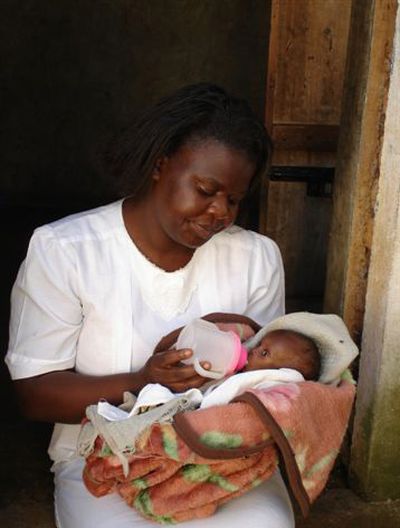Vestal: Partners find formula for success in Kenya

It’s the babies that get you.
When Stacey Mainer and Sandy Ivers talk about the work they do in rural Kenya, it rings with all the sadness and all the hope that stories about Africa can have. Problems that seem so distant from the comforts of America. Solutions that seem like they ought to be simple but aren’t.
But it’s the babies that make everything else seem like pale abstractions. When Mainer and Ivers first visited Kopanga, Kenya, on a medical mission in 2007, they saw an HIV-positive infant so sick and malnourished that they never forgot it. It died soon after they came home.
“That’s the baby,” Mainer said recently, as she looked at photos from that trip. “That was the one that did it for me. It just should not have happened. They should have had medicine. They should have had formula.”
These days, her stories about babies in Kopanga are more hopeful. The group she and Ivers founded, Partners for Progress, has raised tens of thousands of dollars, built a new clinic, worked on a water sanitation project and brought treatment and medicine to the impoverished area. Among its latest initiatives is “The Power of Milk,” an effort to provide formula to malnourished babies.
Next week, the Kenyan nurse who runs the clinic will make her first visit to Spokane, speaking publically, shadowing doctors, and meeting with supporters around the state.
Mainer is a nurse practitioner and Ivers is a former teacher and coach. They both speak of nurse Alice Wasilwa as an inspiration – a native Kenyan who planted herself in one of the bleakest parts of the country and worked in very dedicated, practical ways to make things better. She’s tackled cultural habits that contribute to the region’s high rate of HIV infection. She’s worked hard to bring in resources for the new clinic. She’s trying to change long-standing habits, such as home births, to knock down staggering infant mortality rates.
Kopanga is a rural area comprising three villages near the Tanzanian border in western Kenya. While the whole country faces health, nutrition and sanitation problems, things are even worse in that region: 15 percent of the population has HIV/AIDS; infant mortality is among the highest in the world; there is almost no access to piped water or electricity. Life expectancy is 47 years.
When Mainer and Ivers – along with Dr. Mark Mainer, Stacey’s husband, and Ivers’ then-16-year-old son, Nick – traveled there in 2007, the AIDS epidemic was being compounded by several factors, including a reluctance to using condoms and the absence of the tools to diagnose the disease.
“On our second trip, 40 percent of the people we tested were positive,” Mainer said.
Wasilwa’s clinic had no water, electricity or good latrines. Among the major projects Partners for Progress has undertaken is the construction of a new, $30,000 clinic in the area, which opened last June. Wasilwa has encouraged HIV testing and educated people about the disease.
Partners for Progress helps provide medicine and resources, and is paying five clinic workers’ salaries – half the employees. Mainer and Ivers lead medical missions to the clinic twice a year – about a dozen doctors, nurses and others provide treatment to villagers, work on water sanitation projects and provide other help.
Water sanitation is a major focus of the group now, Mainer said. Water is scarce and dirty. Partners for Progress is spending about $10,000 to dig a well and provide a central location for clean water – such a simple thing, but the number of health problems that derive from dirty water is huge.
“If you don’t address the water situation, all you’re doing is treating the symptom, you’re not getting to the root cause,” Mainer said.
Mainer and Ivers say they want to let Wasilwa set the agenda, with the idea that the clinic will eventually be self-sustaining – and not some flown-from-Spokane help that won’t last. An example is the child nutrition effort. For now, providing formula for the infants is a weapon against malnutrition. In the long run, though, they’re looking to grow millet to provide a regular, sustainable source of local nutrition for kids.
For now, though, the formula is quite literally a life saver.
Mainer and Ivers tell the story of a pair of babies they saw last June who were severely malnourished – tiny legs, big bellies, weak and sickly, “absolutely emaciated.” The mother, who had never before been to a clinic, was ashamed she hadn’t been able to provide for them. They thought the children would die.
“She came to the clinic, got her formula, and those babies are alive,” Mainer said.